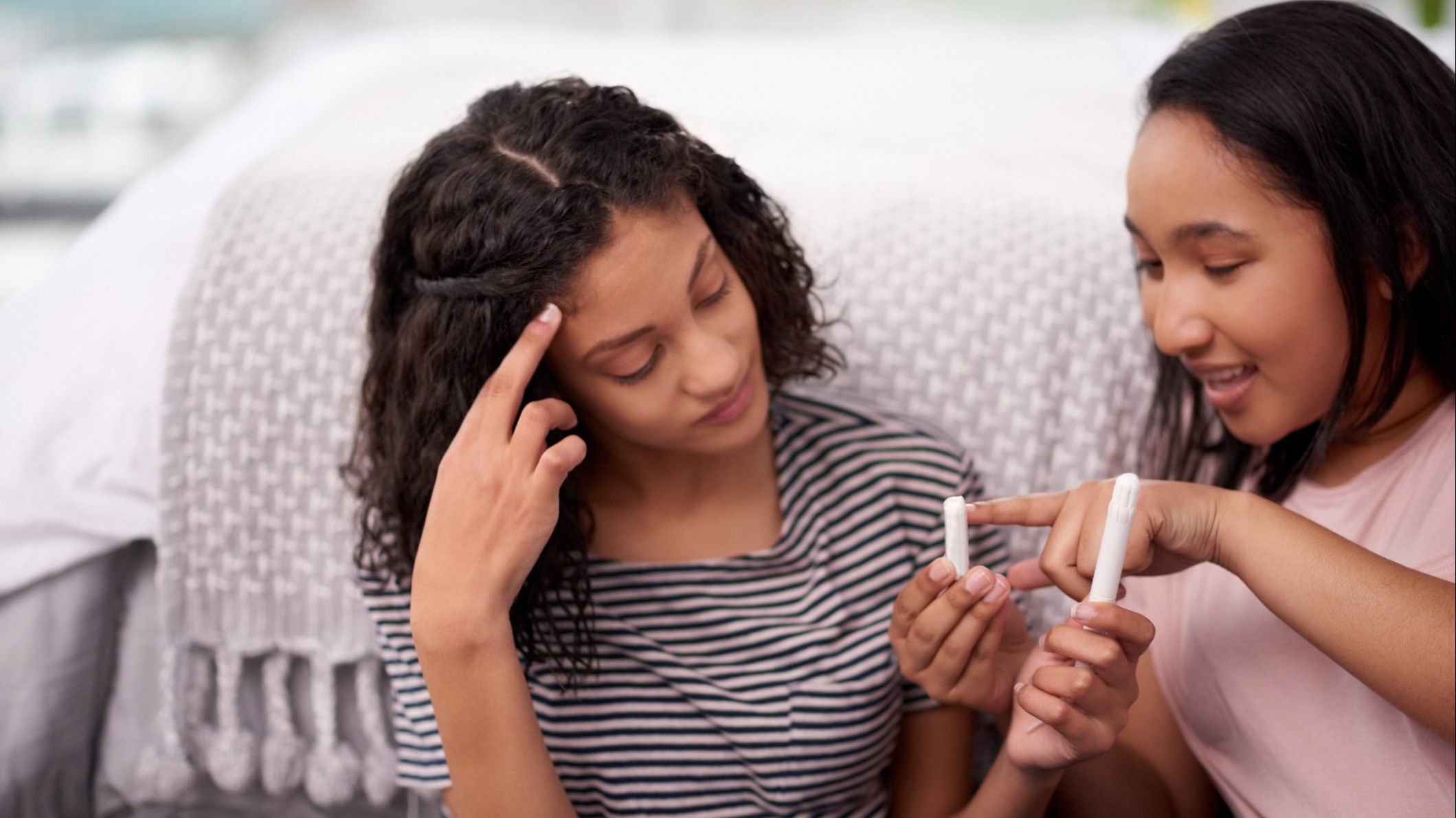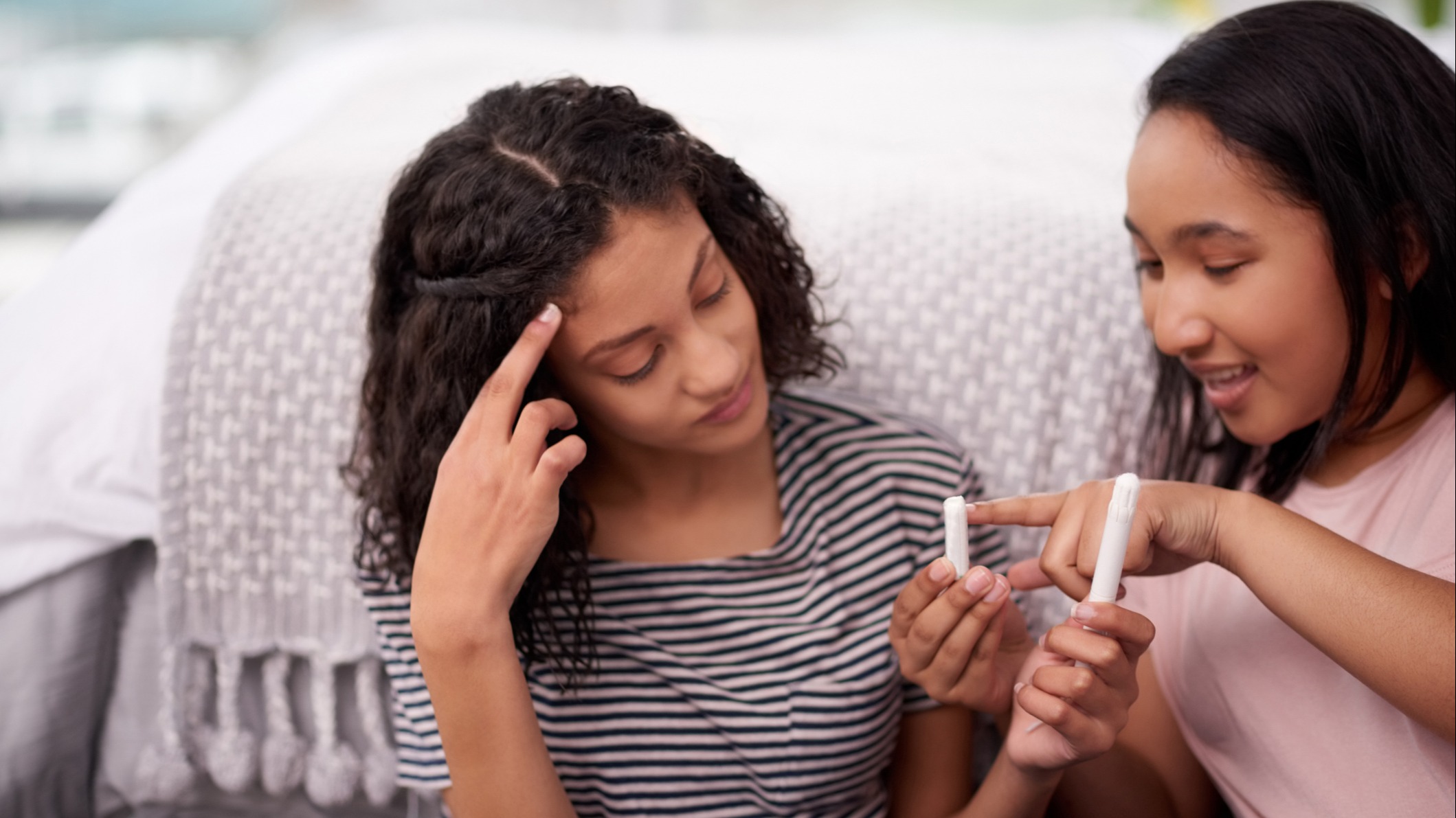
Talking to your child about periods can be awkward, intimidating, and embarrassing on both ends. But it’s a fact of life parents and kids must face together. Luckily, there are some ways to make these conversations easier, especially as some parents need to start approaching this subject with some children under age 10.
“The first period occurs around 12 years of age, on average but there is a wide range of normal from 9 years to 15 years of age,” Ruth Redford, author of the graphic book Period.: The Quick, All-Inclusive Guide for Every Uterus (Mayo Clinic Press Kids) tells LittleThings.
Some parents might find these statistics shocking, as their own periods began much later. “Puberty changes are occurring earlier, regardless of biologic sex,” says Redford. “Some of the changes around earlier periods could be a rise in overweight/obesity rates in adolescents, particularly in the last two or three decades. There is also a theory that endocrine disrupting chemicals or other substances present in our diet or environment is leading to earlier puberty.”
Redford notes, “The age at first period was about 3 to 6 months later than now for mothers of current adolescents. However, the first changes of puberty may have occurred up to 1 to 2 years later in mothers of adolescents today.”
All parents, regardless if your child has a uterus or not, we should begin thinking about these topics at an early age.
OB-GYN Dr. Staci Tanouye tells LittleThings: “Research shows us that comprehensive sexual education is extremely important for healthy mental, physical, and sexual health development. And age-appropriate discussions should start at a very early age."
She details the progression: "In the toddler and preschool years this can be as simple as using correct anatomical terms and teaching basic concepts of consent (using penis, vulva, or vagina instead of nicknames, idea of safe touch/bad touch, safe adults, stranger danger, private parts are private, and even asking permission to give hugs, etc.). In the early grade school years, this can evolve into more detailed conversations about bodies, differences, and how our bodies change as we get older. These conversations should be ongoing and evolving naturally with our kids' growth as well as with their own naturally curious questions — which should also be answered factually and matter-of-factly.”
Many schools will begin teaching students period health-related matters, but that doesn’t mean parents are off the hook.
“It's best if it comes from you, especially before they have these discussions at school,” says Redford. “They will likely have many questions and feelings if they hear about it for the first time from someone else. Plus, they will feel more comfortable talking to you if you've been having ongoing discussions about it over time. I recently read a book about puberty and periods together with one of my children. It provided a great opportunity to delve deeper into topics like puberty, sex, babies, and periods. I gave them the time and space to ask questions on every page. These moments have truly become some of my favorite memories from their childhood so far.”
Dr. Tanouye shares a story of how the talk evolved in her house.
“My oldest son is only in fourth grade so we are still continuing to build on these concepts. When he was about 5 or 6, he asked questions about why there was blood in the toilet after I went (because moms obviously have no bathroom privacy). At that point, he already knew the difference between penis and vulva/vagina so I expanded by saying that when people with vaginas get a little older, they have something called a period once a month, where they bleed through their vagina. That was about the extent of his attention span so we stopped there and he was satisfied with that answer.”
Dr. Tanouye continues, “When he was around second grade, he asked me what tampons were used for after seeing some. Our conversation literally took about two minutes. I said, ‘Remember when we talked about when girls and people who were born with vaginas get periods when they get a bit older? The vagina is connected to the uterus where someday a baby may develop (he already knew this concept from before), but in order for that to happen someday, the uterus has to practice growing a cushy lining every month and if it’s not ready for a baby yet, every month that lining sheds with some blood through the vagina, and we call it a period. Then the whole process starts over again every month. It’s how the body practices and prepares for reproduction or having a baby later on.’ He looked at me and said, ‘That’s so cool!’ and ran off and continued playing. That was it.”
Redford shares tips for adults to talk to a child about periods:
- Be prepared. Children can get very embarrassed, want to know everything and ask awkward questions, or pretend you’re not there.
- Simply start the conversation. It doesn’t have to cover everything right away. Just let them know you’re willing to talk.
- Period basics including: What is a period? Who gets a period? When is it going to happen? How long will it last?
- You might want to discuss puberty and also how hormones affect us.
- PMS symptoms to discuss include cramps, bloating, headaches, and sore breasts.
- Buying some period products and making sure it’s clear where they are kept is helpful. Just a few pads would do at first. Put them in the bathroom, but not on display.
- Encouraging good hygiene and washing of clothes and sheets can be helpful.
- Sharing your experience may not be needed right away. It’s helpful knowing that it’s different for many people and that you’re there for them.
Redford also points to a period pack, which can help your child prepare.
A period pack can be a small purse, pencil case, or makeup bag. It may include pads, spare underwear, wipes, chocolate.
When a child gets their first period, you’ll want to ensure them not to panic but also be sure to tell you. “If your child is finding it hard to talk about, let them know that they can email, text, or send a voice note,” says Redford.
“Every person who menstruates has a different relationship with their ‘Aunt Flow,’” says Redford. “We need to embrace all the icky, all the sticky, and all the confusing aspects of the monthly cycle, acknowledging that there’s no cookie cutter way to manage the physical and emotional mayhem.”
That mayhem might involve a mother in perimenopause or menopause as her child begins the menstruation journey.

“Talk about your own roller coaster of feelings and why that might be happening or labeling it as PMS and show them how we try to handle it and feel better,” says Dr. Tanouye. “For example, ‘I’m feeling really frustrated today which happens a lot right before my period so I’m going to take some time to exercise (or meditate or eat a favorite food or take a long bath) because I know that will help me feel better’ or ‘Can you help me find the heating pad to help me with my cramps? Feel free to use this if you ever feel crampy during your period, too.’”
Dr. Tanouye says, “We also must remember that preteens and teens will be much more dysregulated in their emotions because they haven’t developed those coping skills and their brains are still developing. However, this is hard, because dysregulation can be very triggering to us, which makes it harder for us to cope with their dysregulation. Taking some time to take deep dives into our own experiences might help us better cope with their experiences.”
Dr. Tanouye adds, “I think the hardest part, especially for moms, will be trying to change the narrative. When we grew up, it was more normal to hide these physical and emotional feelings, hide the tampons, not talk about it, and suck up the pain. Normalizing this conversation is not a natural or comfortable thing for us. But be kind to yourself and take baby steps. In the end, we have to show our kids that our bodies are normal and we can talk about it in a supportive way. It really is the best way to keep them educated and safe.”




